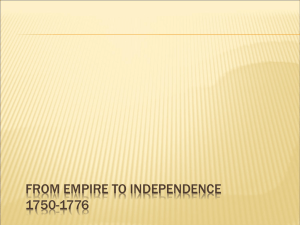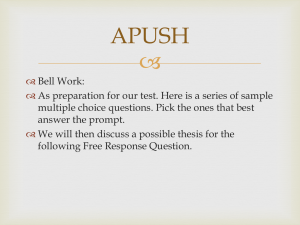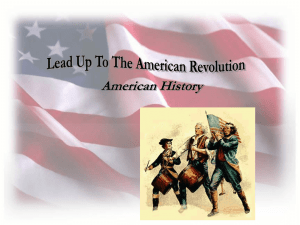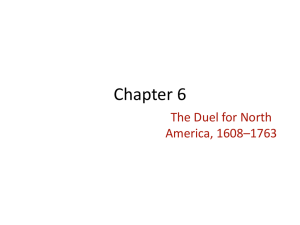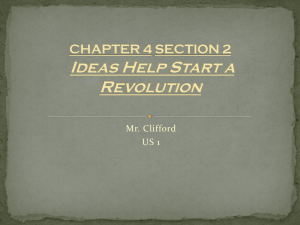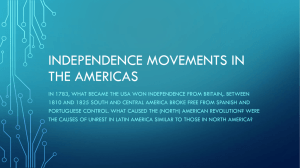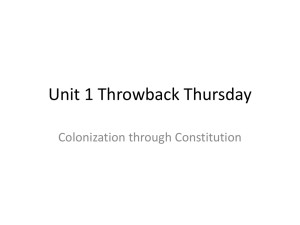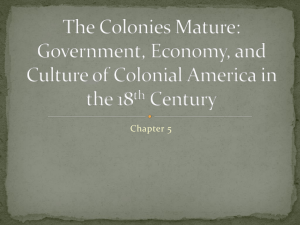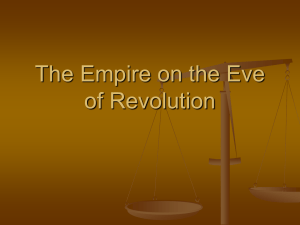French and Indian War – Amer Rev
advertisement
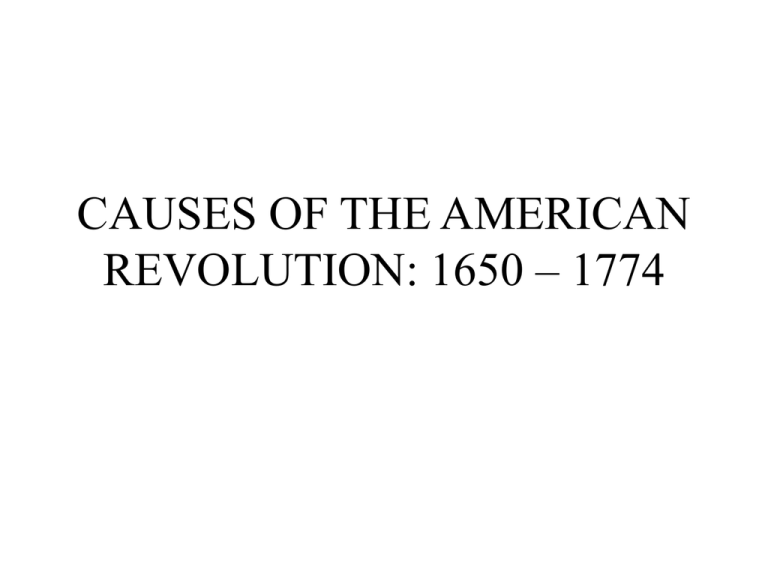
CAUSES OF THE AMERICAN REVOLUTION: 1650 – 1774 Two Revolutions? Anti-Imperialist or Social/Domestic KEY CONCEPTS • Prior to 1763, American capital goes across the pond. • French and Indian War transformed the relationship between Britain and the American colonies. • American colonists were divided over what course of action to take. • The Americans created a government, the Continental Congress, to address the deteriorating relationship between Britain and the colonies. EUROPEAN COLONIES IN THE NEW WORLD • By mid 1700s, France and Britain in interimperialist struggle for dominance in N.A. • French allied with Native American tribes (ex. Algonquin and Huron against Iroquois) • Focal point of French and Indian War is the Ohio River Valley (stop westward expand.) • Albany Congress created • Led by Benjamin Franklin • Goal was to keep Iroquois tribes loyal to Britain • American colonial response to the French became known as the Albany Plan of Union – – – – Carryout diplomatic relations with tribes Control public territory Raise an army Tax colonial citizens • Albany Plan was not accepted: – Colonists too concerned about their own interests – Unwilling to relinquish control to a provincial congress – Created a foundation for future colonial cooperation • British defeat French in the French and Indian War • Results of the Peace of Paris – Britain receive all of French Canada and all territory south of Canada and east of the Miss. – France and Spain lose West Indian colonies – Britain received Florida from Spain – Spain receive from France its territory west of the Mississippi, including control of New Orleans. PROBLEMS INHERITED BY BRITAIN FOLLOWING THE WAR • Political and Economic problems for the British post war • Large debt and a fiscal crisis, force British to respond to needs of empire building: – New land must be governed – Revenue must be raised to absorb costs (citizens in Britain were already taxed heavily) – Native Americans in Appalachian region – French Canadians need to be assimilated – Economic competition from colonists PRE-REVOLUTIONARY WAR BRITISH POLICY IN THE COLONIES • Salutary neglect: 1750-1763 • Limited intervention and management as long as ‘mercantilist policy is profitable • Policies not challenged; infrequently enforced, difficult to implement British Mercantilist Policies Pre-1760 Period • Overseeing trade: British Board of Trade • Navigation Laws – establishes British authority to regulate colonial trade • The Wool (1669), Hat (1732) and Iron (1750) Acts • The Molasses Act (1733) – Rum, not well enforced 1763 – TURNING POINT • Cost of empire exceeding its benefits 1. King George III appoints George Grenville as Prime Minister. Under Grenville, Britain transforms political, economic and trade relationship w/ colonies. 2. Policy of Salutary Neglect is abandoned 3. Proclamation of 1763 DISCONTENT ON THE FRONTIER POST PROCLAMTION OF 1763 ACTS • Sugar (Revenue) Act of 1764 – replaces ineffective Molasses Act of 1733 • Currency Act of 1764 – Forbade colonies from printing currency; all taxes had to be paid in hard (specie) currency • Quartering Act – Provide food and supplies to British troops stationed in the colonies • Stamp Act (1765) – Taxing all virtually all • • • • printed material Virginia’s Patrick Henry, ‘No taxation without representation’ Raises up the colonial middle class 1765- Nine colonies form the Stamp Act Congress; issue a Declaration of Rights Boycotts and rebellion groups like Sons and Daughters of Liberty and the Loyal Nine • Declaratory Act (1766) – Britain repeals the Stamp Act, but declares right to tax through: ‘virtual representation’ • Colonial response: – Boycott – Circular letter – John Dickinson, ‘Letters from a Pennsylvania Farmer’ (1767) – Tar and Feathering – Boston Massacre (1770) – Crispus Attucks – Paul Revere and Sam Adams – Committees of correspondence- exchange of ideas and unified response by colonial govt’s. TEA TIME!!! • Gaspee Incident • Boston Tea Party – Tea prices fall dramatically – Parliament passes regulations to give British East India Company monopoly on tea trade – December 16,1773 – Boston Tea Party – Governor Hutchinson returns to England BRITISH RESPONSE: INTOLERABLE (COERCIVE) ACTS OF 1774 • The Boston Port Bill – – closed the port of Boston; relocated customs house • The Administration of Justice Act – – trials for royal officials held in Britain • The Massachusetts Government Act– limited right to organize freely; Crown appointments CHARLES TOWNSHEND CHARLES TOWNSHEND • British elites critical of Parliament’s appeasement of the colonies • ‘Champaign Charlie’ new Prime Minister • Townshend Acts (1767) • Prices inflated to cover taxes • Suspended New York Assembly • American Board of Customs; admiralty courts • Quartering Act expands to include housing • The Quebec Act (1774) – – – – Purpose to incorporate French Canadians Quebec’s boundary extended to the Ohio River Catholicism recognized as official religion Nonrepresentative government was established • Condemned by colonists: – Feared precedent of nonrepresentative gov’t. – Resented territorial expansion – Offended by Crown’s recognition of Catholicism THE FIRST CONTINENTAL CONGRESS • 12 colonies represented – most want peace • 3 distinct groups of delegates form – Radicals; force Britain to accede to their demands or declare independence – Moderates; relationship between colonies and Great Britain could be repaired – Conservatives; colonial ‘grand council’ Galloway • Galloway Plan rejected opening way to radicals • Use Thomas Jefferson's, A Summary View of the Rights of British America as philosophical inspiration – Parliament possessed no inherent authority to tax colonists – The British Empire was a compact between the itself and the colonies – Each colony possessed its own legislature independent of Britain’s legislative authority – Collective allegiance to the king. • Delegates adopted a statement of rights: – The Declaration of Resolves (originally enacted in Massachusetts as the Suffolk Resolves) – Declare Intolerable Acts null and void – Recommend colonists arm themselves and militias be formed – Boycott of British goods (“Associations” formed in each colony) THE AMERICAN REVOLUTION: 1774 - 1783 • KEY CONCEPTS: – Both British and Colonists had military, political and economic disadvantages and advantages in the war – The Battle of Saratoga was the turning point of the war; brings in French support. – Black Americans played an important role in the war – American victory did not fundamentally change the condition or status of blacks or women • Thomas Gage, royal governor of Mass. dispatches troops to seize military supplies in Lexington and Concord. • 8 militia killed at Lexington; over 300 British killed during battle at Concord • Lexington and Concord has a lightning rod effect over the colonies • Colonists begin organizing to confront the British • Second Continental Congress assembles in Philadelphia • Congress draws up military plans in the Declaration of the Causes and Necessities for Taking Up Arms – Army to be organized and led by George Washington – Navy to be created to disrupt British shipping – Military expedition to be led by Benedict Arnold to wrest Canada from British Empire • Troops from both sides pour into Boston • Battle of Bunker Hill – British overtake and drive-out Americans, but not after fierce battle. • Colonists able to stand ground against European power • Olive Branch Petition to King George III • Prohibitory Act: – Declared all of the colonies in open rebellion and suspended all trade DECLARATION OF INDEPENDENCE • Richard Henry Lee (VA.) introduces resolution • Thomas Jefferson– Influenced by Enlightenment thinkers – Preamble explains the necessity of independence for the preservation of basic natural laws and rights (John Locke, Two Treatises of Government and Jean-Jacques Rousseau’s, Social Contract) • Second part of the document lists a series of ‘abuses and usurpations’ by the king and his government • King violated the social contract justifying the actions of the colonists • Ends with informal declaration of war • Second Continental Congress appointed committee to draft the first constitution of the United States – the Articles of Confederation THE TREATY OF PARIS (1783) • American diplomats: John Jay, Benjamin Franklin and John Adams • Concerned over French interests • Terms: – Britain formally and unconditionally recognizes independence of United States – Boundaries established • American fishing ships were given unlimited access to the waters off Newfoundland • U.S. gov’t would not interfere legally with British creditors and merchants seeking to collect debts owed to them by Americans • United States would compensate loyalists whose property had been confiscated during the war • WOMEN and the REVOLUTION – Women’s rights not addressed by a major reform movement until the mid-1800s – Will not get right to vote until 1919 – Abigail Adams voices concern for lack of rights for women – Women play major role in maintain economy – Ran family farms and businesses – Provided essential supplies – Nurses – Patriarchic Hal society survives • BLACKS and the REVOLUTION – Many Founding Fathers (i.e. Washington and Jefferson) owned slaves – Dr. Samuel Johnson, “How is it that the loudest yelps for liberty come from the drivers of slaves?” – Blacks fought on both sides of the war – Some had fought in French and Indian War – Continental Congress prohibited blacks from serving in the Cont. Army (south pressure) – 5,500 fought for the American side (segregated) Two Revolutions? Anti-Imperialist or Social/Domestic
